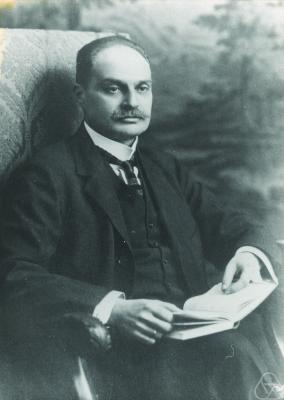Friedrich Hartogs (nonfiction): Difference between revisions
No edit summary |
No edit summary |
||
| (2 intermediate revisions by the same user not shown) | |||
| Line 1: | Line 1: | ||
[[File:Fritz_Hartogs.jpg|thumb|]]'''Friedrich Moritz "Fritz" Hartogs''' (20 May 1874 – 18 August 1943) was a German-Jewish mathematician, known for his work on [[Set theory (nonfiction)|set theory]] and foundational results on [[Several complex variables (nonfiction)|several complex variables]]. | [[File:Fritz_Hartogs.jpg|thumb|Friedrich Hartogs.]]'''Friedrich Moritz "Fritz" Hartogs''' (20 May 1874 – 18 August 1943) was a German-Jewish mathematician, known for his work on [[Set theory (nonfiction)|set theory]] and foundational results on [[Several complex variables (nonfiction)|several complex variables]]. | ||
== Life == | == Life == | ||
| Line 17: | Line 17: | ||
* Hartogs's theorem | * Hartogs's theorem | ||
* Hartogs–Rosenthal theorem | * Hartogs–Rosenthal theorem | ||
References | |||
Hartogs, Fritz (1906), "Einige Folgerungen aus der Cauchyschen Integralformel bei Funktionen mehrerer Veränderlichen.", Sitzungsberichte der Königlich Bayerischen Akademie der Wissenschaften zu München, Mathematisch-Physikalische Klasse (in German), 36: 223–242, JFM 37.0443.01. | |||
Hartogs, Fritz (1906a), "Zur Theorie der analytischen Funktionen mehrerer unabhängiger Veränderlichen, insbesondere über die Darstellung derselber durch Reihen welche nach Potentzen einer Veränderlichen fortschreiten", Mathematische Annalen (in German), 62: 1–88, doi:10.1007/BF01448415, JFM 37.0444.01. Available at the DigiZeitschriften. | |||
Hartogs, Fritz (1915), "Über das Problem der Wohlordnung", Mathematische Annalen (in German), 76: 438–443, doi:10.1007/BF01458215, JFM 45.0125.01. Available at the DigiZeitschriften. | |||
== In the News == | == In the News == | ||
| Line 37: | Line 42: | ||
* [[Set theory (nonfiction)]] | * [[Set theory (nonfiction)]] | ||
* [[Several complex variables (nonfiction)]] | * [[Several complex variables (nonfiction)]] | ||
External links | |||
== External links == | |||
* [https://en.wikipedia.org/wiki/Friedrich_Hartogs Friedrich Hartogs] @ Wikipedia | * [https://en.wikipedia.org/wiki/Friedrich_Hartogs Friedrich Hartogs] @ Wikipedia | ||
* [http://www-history.mcs.st-andrews.ac.uk/Biographies/Hartogs.html Friedrich Moritz Hartog] - O'Connor, John J.; Robertson, Edmund F., MacTutor History of Mathematics archive, University of St Andrews. | |||
[[Category:Nonfiction (nonfiction)]] | [[Category:Nonfiction (nonfiction)]] | ||
[[Category:Mathematicians (nonfiction)]] | [[Category:Mathematicians (nonfiction)]] | ||
[[Category:People (nonfiction)]] | [[Category:People (nonfiction)]] | ||
[[Category: | [[Category:Suicides (nonfiction)]] | ||
Latest revision as of 13:16, 18 August 2018
Friedrich Moritz "Fritz" Hartogs (20 May 1874 – 18 August 1943) was a German-Jewish mathematician, known for his work on set theory and foundational results on several complex variables.
Life
Hartogs was the son of the merchant Gustav Hartogs and his wife Elise Feist and grew up in Frankfurt am Main. He studied at the Königliche Technische Hochschule Hannover, at the Technische Hochschule Charlottenburg, at the University of Berlin, and at the Ludwig Maximilian University of Munich, graduting with a doctorate in 1903 (supervised by Alfred Pringsheim. He did his Habilitation in 1905 and was Privatdozent and Professor in Munich (from 1910 to 1927 extraordinary professor and since 1927 ordinary professor). As a Jew, he suffered greatly under the Nazi regime: he was fired in 1935, was mistreated and briefly interned in KZ Dachau in 1938, and eventually committed suicide in 1943.
Work
Hartogs main work was in several complex variables where he is known for Hartogs's theorem, Hartogs's lemma (also known as Hartogs's principle or Hartogs's extension theorem) and the concepts of holomorphic hull and domain of holomorphy.
In set theory, he contributed to the theory of wellorders and proved what is also known as Hartogs's theorem: for every set x there is a wellordered set that cannot be injectively embedded in x. The smallest such set is known as the Hartogs number or Hartogs Aleph of x.
Known for
- Hartogs domain
- Hartogs–Laurent expansion
- Hartogs's extension theorem
- Hartogs's lemma
- Hartogs number (includes Hartogs's function)
- Hartogs's theorem
- Hartogs–Rosenthal theorem
References Hartogs, Fritz (1906), "Einige Folgerungen aus der Cauchyschen Integralformel bei Funktionen mehrerer Veränderlichen.", Sitzungsberichte der Königlich Bayerischen Akademie der Wissenschaften zu München, Mathematisch-Physikalische Klasse (in German), 36: 223–242, JFM 37.0443.01. Hartogs, Fritz (1906a), "Zur Theorie der analytischen Funktionen mehrerer unabhängiger Veränderlichen, insbesondere über die Darstellung derselber durch Reihen welche nach Potentzen einer Veränderlichen fortschreiten", Mathematische Annalen (in German), 62: 1–88, doi:10.1007/BF01448415, JFM 37.0444.01. Available at the DigiZeitschriften. Hartogs, Fritz (1915), "Über das Problem der Wohlordnung", Mathematische Annalen (in German), 76: 438–443, doi:10.1007/BF01458215, JFM 45.0125.01. Available at the DigiZeitschriften.
In the News
Fiction cross-reference
Nonfiction cross-reference
- Mathematician (nonfiction)
- Mathematics (nonfiction)
- Set theory (nonfiction)
- Several complex variables (nonfiction)
External links
- Friedrich Hartogs @ Wikipedia
- Friedrich Moritz Hartog - O'Connor, John J.; Robertson, Edmund F., MacTutor History of Mathematics archive, University of St Andrews.
